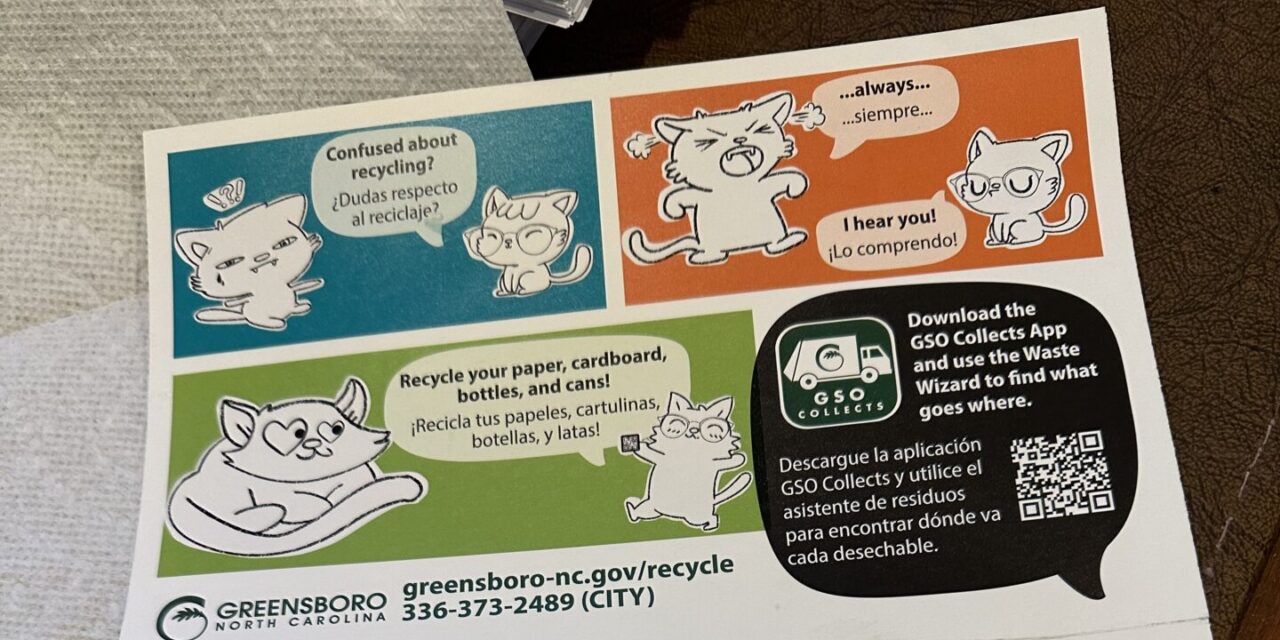So is the cat right? Is it true that you can once again put bottles in your brown recycling bin?
No. Despite what the cat says, glass bottles still need to be taken to a glass recycling location and not placed with cardboard, paper, cans and plastic containers in the brown recycling bin.
It might appear the current goal of the City of Greensboro is to make recycling so complicated and confusing that people will quit recycling altogether. It is an expensive endeavor.
If that isn’t the goal, it’s hard to figure out what is.
First, the city sent out an incorrect recycling calendar. Garbage and yard waste are picked up every week on a designated day, but recycling and bulk items are picked up every two weeks, which creates the need for a calendar to remind people which weeks are recycling weeks for them.
Somehow nobody at the city discovered the calendar was incorrect until after it was already in the mail.
So the City of Greensboro asked residents to “recycle” the first incorrect calendar that was sent out and use the second.
The photo at the top of the page is of the new, improved recycling calendar the city sent out and that most people received this week.
For some reason, cats wearing glasses are considered experts in recycling, and this is what the glasses wearing cat recycling expert tells the people of Greensboro to do: “Recycle your paper, cardboard, bottles and cans!”
The City of Greensboro does recycle paper, cardboard, bottles and cans, and three of those items should be placed in the brown recycling container to be recycled.
But one of those items does not belong in the brown recycling container and that would be bottles. To recycle glass bottles, residents of Greensboro are asked to take the bottles to a glass recycling location and place them in a blue glass recycling container.
If you go to one of these glass recycling locations and look in the blue container, what you will find are mostly bottles. Wine bottles, beer bottles, juice bottles, all kinds of glass bottles and some glass jars.
The notice from the city certainly makes it appear that the city is once again collecting bottles of any kind in the brown residential recycling containers, but that is not the case at all.
Evidently, the glasses wearing cat expert on recycling is not an expert in the English language. The cat should be saying, “Recycle your paper, cardboard, plastic bottles and cans.”
On the inside of the flyer, there is a list of items that can be recycled which has:
- Paper & Cardboard
- Metal Food & Drink Cans
- Plastic Bottles, Tubs & Jugs.
But the outside of the flyer, the part people are more likely to see just says “bottles,” a category that would include both glass and plastic bottles.
And to compound the confusion, there is nothing on the inside that indicates how glass bottles are correctly recycled under the current complicated and confusing Greensboro recycling program.
In the first frame the glasses wearing cat expert on recycling asks, “Confused about recycling?”
The correct answer is: Yes, and you’re not making it any better.


Another SNAFU! Keep your expectations low and you will be a happy citizen. Try to use your vote wisely on the next round.
We get what we vote for. Somebody had just one job.
Pardon this phrase but this city council can screw up a “wet dream”
So , the Dept. of Sanitation or whatever they’re calling it now-a-days is into diversity hires ?
We are governed by idIots.These are the same idiots worried that we leave our trah cans out too long/
If the city can recycle, than can up leaves & yard waste. The city is not in the business to make a profit, but to use our money for things we cannot do.
I detest our government. Name something our government does well.
If I had it my way, and this error was created by a employee of mine, they would see the door or have to pay my company back the money spent to correct the problem. That will not happen in Blacksboro the taxpayers just have to suck it up!
It’s recommended that local authorities take proactive measures to address the confusion, such as:
Communication Efforts: Increase communication through various channels, including official websites, social media, and community newsletters. Clear and consistent messaging can help residents understand the changes more effectively.
Educational Resources: Provide educational resources, such as infographics or pamphlets, that visually outline the new recycling schedule. Visual aids can often simplify complex information.
Community Engagement: Host town hall meetings or virtual sessions where residents can ask questions and receive clarification directly from recycling program representatives. Community engagement fosters understanding and cooperation.
Feedback Mechanism: Establish a feedback mechanism for residents to express concerns or seek clarification. This creates a transparent dialogue between the community and the recycling program administrators.